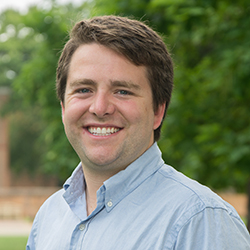 By John Weber
By John Weber
2016 BJC Fellow
The Baptist Joint Committee for Religious Liberty’s Fellows Program prides itself on its advocacy in litigation, legislation, and education. These are obviously all intertwined with aspects of theology and spirituality. This perfectly matches my interests and experiences, and it was a wonderful opportunity for me.
My faith has always been an important part of my life. I grew up in a Baptist church in Kentucky, surrounded by a community of other believers. I cared about the religious freedom of others in a theoretical way, primarily for other Christians around the world. However, the issue became much more personal to me when I taught 12th grade government in a tremendously diverse school in Nashville, Tennessee. I realized that religious freedom wasn’t an abstract concept, and it certainly wasn’t just meant for one religion.
Between teaching government, earning a degree in Political Science, and now pursuing a Juris Doctorate, I have a profound appreciation for the United States Constitution and the Bill of Rights. Because of my reverence for our founding documents, I was at first taken aback to hear that religious freedom is a gift from God, not from government at one of the Fellows seminars. This challenged the way that I thought about the issue. Our government didn’t have to provide the freedom of religion, I thought. In fact, its language was far from guaranteed during the constitutional debates. But then I realized what Thomas Jefferson, whom we met in Colonial Williamsburg, wrote in the Declaration of Independence. All people were given “certain inalienable rights,” those that no government could rightfully deny. Religious freedom is truly between people and God, and though governments play an important role in protecting this privilege, its ultimate source is our Creator.
I thoroughly enjoyed the focus on legal issues in current events. The First Amendment’s religious freedom guarantees are separated into the Establishment Clause and the Free Exercise Clause. Christians in the United States are fortunate to freely exercise their religion for the most part. However, the Baptist Joint Committee realizes that an infringement on the religious liberty of one, presents an issue for all. Accordingly, we stand with Christians, Muslims, atheists, and those that exercise other religious beliefs. We are willing to uphold the underlying principle that provides freedom for all, regardless of our beliefs. This is a legal principle. This is a theological principle. God gives us the choice to follow him and our principles of religious freedom respects people’s ability to choose for themselves.
At the same time, I was glad to learn that Christians need not completely separate themselves from their faith when they work in government. It is important for us to embrace our personal religion in the “public square,” politics, and even policymaking. However, it is equally important to respect the religion, or non-religion of our fellow citizens and not impose our beliefs on others through the government. This balance is a vitally important, and necessary, one to strike.
We are fortunate to have the Baptist Joint Committee for Religious Liberty to help maintain our constitutional freedoms, and educate the citizenry on respecting and learning from the diversity of religious thought in the United States of America. I look forward to working alongside this organization in Washington, D.C. and my community to preserve the rights of religious liberty for all.
Read other reflections from BJC Fellows and visit BJConline.org/Fellows for more on the program.




